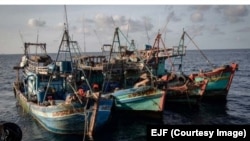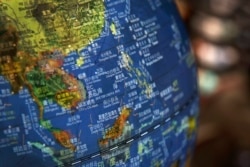A Beijing-based think tank released a report in early August to show that a few hundred Vietnamese fishing boats had entered Cambodia-controlled maritime areas in the Gulf of Thailand since June.
The South China Sea Strategic Situation Probing Initiative (SCSPI), which is affiliated with the Peking University’s Institute of Ocean Research, published a report titled “Vietnamese Fishing Vessels’ Illegal Activities Remained High in July”.
It reported Vietnamese fishing vessel movements near China, Malaysia, Indonesia, and Cambodia.
“In July, a total of 100 Vietnamese fishing boats intruded into the waters of Cambodia in the Gulf of Thailand, which was down by 30% from 157 in June,” the report reads.
The report alleged that Vietnamese fishing boats were conducting illegal, unreported, and unregulated (IUU) fishing activities.
The think tank said the incursions near Guangdong and Hainan were likely reconnaissance missions, given these areas were critical for the Chinese army and navy.
The research was based on data obtained from an automated identification system, which uses information about ships to other ships and coastal authorities.
“By doing so, they are, on the one hand, creating disputes, on the other, taking advantage of law enforcement loopholes in these areas.”
Vietnam and China are disputants in the South China Sea conflict, where China has not allowed Vietnamese boats to enter the disputed area, even sinking a few vessels, with Vietnam raising strong public objections.
Touch Poleak, chief of Cambodia’s maritime police department, denied there were intrusions into Cambodian waters by foreign vessels, declining to answer questions about the tracking and radar systems used to report any such incursions.
“During this time of Covid-19 pandemic I can guarantee that such illegal trespassing of our maritime border areas is impossible and ceased to exist,” Touch Poleak said.
Touch Poleak admitted that there have been cases before the coronavirus pandemic where foreign fishing vessels had been able to “intrude” in the “historic waters” area, between Vietnam-controlled Phu Quoc and Tho Chu islands and Cambodian-controlled Poulo Wai, Seh islands, and a maritime area of Cambodia’s Kampot Province.
“There have been none of them since February and March,” he said.
Attached to the report, the SCSPI supplied a list of the vessel names, codes, time, locations where the incursions were made in Cambodian waters.
The SCSPI posted a link to its report on Twitter a day after an incident on Monday in which the Malaysian coastguard shot dead a Vietnamese fisherman in the South China Sea.
“SCSPI may want to prove that Vietnamese illegal fishing also causes problems to other Southeast Asian countries,” said Leng Thearith, director of the Phnom Penh-based Mekong Centre for Strategic Studies at the Asian Vision Institute.
Leng Thearith said the finding by the Chinese think tank put the Cambodian government in a difficult position – to either act on fishing vessel incursions or ignore them.
“On the one hand, it has to do something to protest against such activities [as it violates Cambodia’s territorial sovereignty]; on the other hand, it does not want the issue to severely affect the overall relations with Vietnam.”
Collin Koh, a research fellow at the S. Rajaratnam School of International Studies in Singapore, said that while Cambodian naval forces have limited capability to handle any maritime encroachments, the question was whether Cambodia would respond.
“Is Phnom Penh willing to ‘rock the boat’ with Hanoi, considering not only close political, trade and security links but a recent spate of sensitive issues – such as the row over Vietnamese tents along the border area?” Collin Koh asked.
He added that it was important to note that the SCSPI was part of China’s efforts to put forth its maritime strategic viewpoint, though not limited to just the South China Sea.
The maritime security expert said while China was accused of similar incursions, Vietnamese controversial fishing activities have also been notable, given recent incidents between Vietnamese fishermen and the coastguards of Indonesia and Malaysia.
“Such incidents may undermine goodwill between ASEAN member states, and could be a bad hindrance against any united front on the SCS issues,” Collin Koh said, referring to the South China Sea conflict.
The SCSPI, in its conclusion of the report, questioned the U.S. assistance to the Vietnamese government in a memorandum of understanding signed on July 22 to curb the illegal, unreported, and unregulated (IUU) fishing activities.
“No matter what the US and Vietnam are planning for, if they were for an early resolution of the IUU problem, the international community would like to see solid results from this cooperation that the intruding Vietnamese fishing vessels could take a favorable turn and finally be under control.”
Calls to the Vietnamese Embassy in Phnom Penh went unanswered, and the U.S. embassies in Phnom Penh and Hanoi did not respond to a request for comment as of press time.






